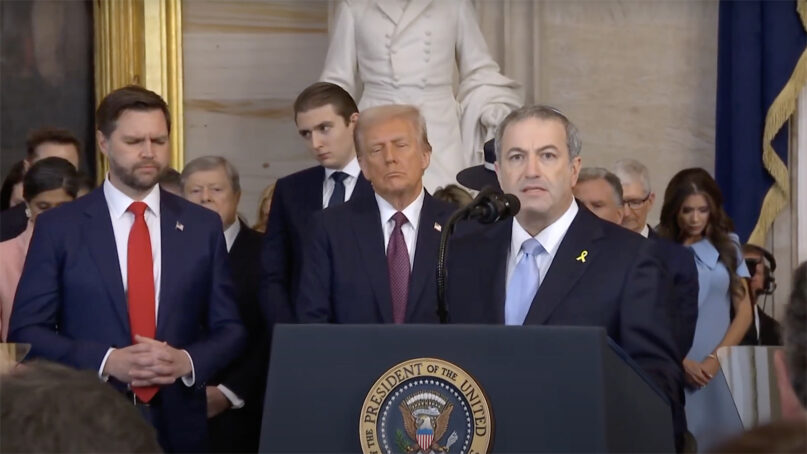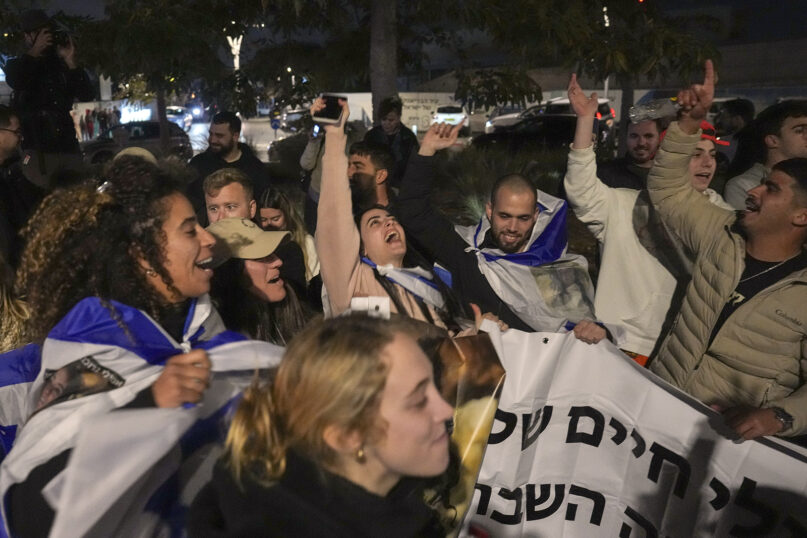JERUSALEM (RNS) — Hundreds of Israelis gathered in downtown Jerusalem on Monday (Jan. 20) to celebrate Donald Trump’s inauguration as the 47th president of the United States.
Crowded into the Friends of Zion Museum, where a banner declaring “Congratulations Donald Trump, Israel Loves You!” hung from the exterior, guests nibbled on hot dogs, onion rings, chicken wings and chocolate brownies. Many wore red baseball caps bearing the American and Israeli flags and the words “God Bless President Trump,” which were handed out in the lobby.
The crowd, which included American expatriates and native-born Israelis, watched the inauguration on a series of video screens, clearly moved by the experience and especially excited at the benediction by Rabbi Ari Berman, the president of Yeshiva University in New York.
Wearing a yellow ribbon pin in honor of the 94 hostages still in Hamas captivity, Berman, who studied in Israel, implored God to “hear the cry of the hostages, both American and Israeli, whose pain our president so acutely feels.” He prayed that the years of the Trump presidency will bring peace to Israel and the Middle East.
The day before the inauguration, Hamas released three Israeli hostages and Israel released 90 Palestinian prisoners in the first phase of a three-phase ceasefire agreement expected to take months. If the ceasefire holds, all hostages and 1,904 Palestinian prisoners and detainees will be set free.

Rabbi Ari Berman prays at the inauguration of Donald Trump in the U.S. Capitol rotunda in Washington, D.C., on Jan. 20, 2025. (Video screen grab)
Many Israelis are crediting Trump for helping to break the deadlock between Israel and Hamas, after he promised “all hell will break loose” if the hostages were not freed by the time he assumed office.
In a poll conducted by the Israel Democracy Institute last November, just prior to the U.S. presidential election, nearly two-thirds of Israeli respondents said Trump was the better candidate for Israel’s interests, compared with only 13% who preferred Vice President Kamala Harris. Less than 16% expressed no preference.
Among 18- to 34-year-olds, 90% of respondents said Trump would be better for Israel, while just 2% favored Harris. Middle-aged Israelis also expressed more confidence in Trump than Harris, by a 71% to 10.5% margin.
Among Israeli Jews, the preference for Trump was even stronger at 72%, while a plurality of Israeli Arabs (46%) felt there was no difference between Trump and Harris (the rest of the Arab sample was divided, with Trump edging Harris out with 27% compared with 22.5% for Harris).
After 15 months of war, security and peace in the Middle East are top concerns for Israelis, including the estimated 400,000 to 600,000 Americans who live in Israel. The fourth largest group of eligible American voters outside the U.S., American expats in Israel have voted consistently for Trump in each of his elections, but this year, engagement was particularly high, which many have attributed to the ongoing conflict.
Yonatan Freeman, an expert on international relations at the Hebrew University, believes the Biden administration’s policies “were very pro-Israel overall” with regards to providing armaments and backing Israel when its legitimacy was challenged by international bodies. “But it seemed that there were many voices in the White House and Democratic Party that were very critical of Israel” when it came to the amount of humanitarian aid going into Gaza or on the question of whether Israel was committing genocide.

Israelis celebrate the release of three hostages who had been held captive by Hamas in Gaza as they gather in Tel Aviv, Israel, Jan. 19, 2025. (Photo/Ariel Schalit)
When the Biden-Harris government froze an arms shipments to Israel in May, at a time Israeli military leaders felt the need was critical, it created the perception that Israel could not rely on the administration, Freeman said.
In contrast, during Trump’s first four years in office, his administration quit the Iran deal, recognized Israeli sovereignty over Jerusalem and the Golan Heights and defunded the United Nations Relief and Works Agency, the humanitarian aid organization that, according to Israel, has enabled Hamas’ terror operations. Trump’s administration also brokered the Abraham Accords, which aimed to normalize relations between Israel and Bahrain, and between Israel and the United Arab Emirates.
Trump’s decision to name Mike Huckabee, an evangelical Christian, as U.S. ambassador to Israel has pleased far-right Israeli Jews intent on maintaining Jewish settlements in the West Bank. So, too, did Trump’s cancellation of sanctions against violent settlers.
The move was praised by Finance Minister Bezalel Smotrich, a far-right parliamentarian.
“These sanctions were a severe and blatant foreign intervention in Israel’s internal affairs and an unjustified violation of democratic principles and the mutual respect that should guide relations between friendly nations,” Smotrich wrote on social media.
While the settlements are a hotly debated topic in Israel, no one disputes that Hamas must release the hostages.
“I think Trump is a pompous bigot with delusions of grandeur, but I admit that I was pleased to see him center the hostages on Inauguration Day,” said Yonatan Kohen, a taxi driver who watched the inauguration events on his cellphone. “To see released hostages and the families of current hostages standing right next to Trump, photos of their loved ones in their hands, was a class act.”
Ohaya Berkowitz, an American Israeli attending the museum event, said she has high hopes that Trump will make good on his election promises, from improving the American economy to strengthening U.S.-Israel relations.
“I expect Trump to help Israel eradicate Hamas and to help get all of our hostages home. I am excited to see a leader who is a real friend of Israel stand by his words,” Berkowitz, from Texas, said.
Julie Sharabi, who moved to Israel from Los Angeles, is also optimistic.
“For many months the ceasefire was going nowhere, and Trump seems to have been instrumental in achieving it. If his first four years in office showed us anything, it’s that he’s got our back.”